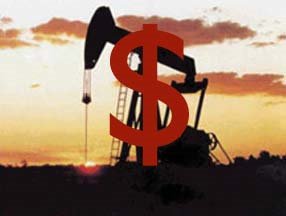 |
Petrodollar wars....
Once upon a time in 1974, the US and OPEC came to an agreement: all petroleum sales throughout the world would have to take place using US dollars.
According to William Clark, the particulars of this deal are revealed in The Hidden Hand of American Hegemony: Petrodollar Recycling and International Markets, (1999) by Dr. David Spiro. In short, the Nixon administration negotiated with Saudi Arabia (which has the largest oil reserves in the world) to price oil in dollars, then invest their surplus oil proceeds back into US Treasury Bills. In return, the US would protect the Saudi regime.
The phenomenon has become known as "petrodollar recycling.” With several notable recent exceptions (that I’ll get to) the agreement has held to this day. Any country—Britain, Israel, Brazil, France, India, China, Russia, you name it—that wants oil needs to pay in US dollars and purchase the oil through one of two bourses, in New York or London.
Naturally, since every modern economy runs on petroleum, this forces the world’s national banks to maintain substantial reserves of US dollars. Which, in turn, keeps the dollar’s price artificially high despite America’s huge foreign debt, massive budget deficits, and incessant printing of dollars--all of which would normally devalue the dollar.
In essence, the US dollar is backed by petroleum—black gold—in the way it used to be backed by gold. This situation is no conspiracy theory: it's well documented across the web. See here, here, and this excellent movie. Or Google the topic.
So, what about those notable exceptions? Can you guess which countries they were?
First, in November, 2000 (10 months before the attacks of 9/11), Saddam Hussein in Iraq—which some estimate to possess the second largest oil reserves in the world—switched its UN oil-for-food sales from dollars to Euros. At the time, one Euro cost 82 cents. By June, 2003, when the US began once more selling Iraqi oil in dollars, one Euro cost $1.17. The exchange rate has since hovered between $1.21 and $1.29 for the two years I've lived in Ireland.
By late August, 2002, Iran had also shifted the majority of its currency reserves from US dollars to Euros in preparation for its widely publicized plans to establish in Tehran an oil bourse to rival New York’s and London’s. The bourse's start date was to have been March, 2006, but not surprisingly it has been delayed.
Next, North Korea shifted its trade from dollars to Euros in December, 2002, and the 'Axis of Evil" was complete. Kim Jong-il’s actions, however, including his dogged pursuit of nuclear weapons and the long-range missiles to deliver them, have so far failed to really get Bush's attention.
No oil reserves in North Korea.
Finally, Hugo Chavez--target of the failed CIA-backed coup in April, 2002--has been steadily removing large parts of Venezuela’s oil trade (world’s fourth largest producer) from the orbit of the US dollar. Ongoing US-backed attempts to remove him from power seem likely.
In sum, as William Clark says, while a collective switch by OPEC from the US dollar to the Euro appears extremely unlikely, a gradual shift seems plausible. With potentially devastating consequences for the US economy.
Combine this with the fact that the world has either reached or is close to reaching peak oil reserves, meaning the remaining oil will be increasingly more difficult and expensive to extract and refine, and the US invasion and permanent occupation of Iraq makes sense in a depraved "real-politic," imperial sort of way.
Far more sense than a mythical search for non-existent WMD.

No comments:
Post a Comment